Swachh Bharat - Mission impossible
Swachh Bharat - Mission impossible
Mangalore Today News Network
By Harsha Raj Gatty
Mangaluru, Nov 30, 2019: It is a pity that India continued to be identified as one of the most cleanliness and hygiene deficit countries across the world. A former Minister of Information and Communication once chided ‘Swachh Bharath’ initiative as among the ’pedestrian issue’ which had to be taken up by the Prime Minister of India.
But true, it’s not just the honourable Minister who thought so, for majority of us till few years ago cleanliness was a matter of tokenism for occasions such as World Environment day, or probably for debates and discussion – that usually ended quoting famed phrase of Mahatma Gandhi ‘Cleanliness is next to Godliness’. However, apart from our homes, filth and stench is something that we all saw growing-up around on our streets or abandoned at empty site or roads.
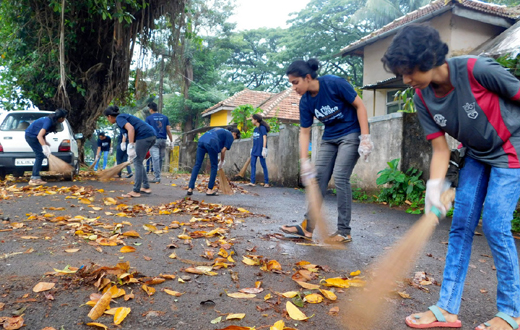
It is under this context we have to examine the role played by Swachh Bharat Abhiyan (SBA) led by Prime Minister of India, Narendra Modi himself that changed people’s perspective, attitude towards cleanliness - which otherwise was looked-upon as a demeaning occupation or role.
Although, very highly popular it was not for the first time that a program like Swachh Bharath Abhiyan (SBA) was launched in the country. Right from 1956, the centrally - aided government sanitation campaign did exist in the country and are packaged and re-packaged time and again under different names. By 1986, it was called as Central Rural Sanitation Programme, Total Sanitation Campaign in 1999 and Nirmal Bharat Abhiyan in 2012. However Swachh Bharath Mission (SBM) has been lauded across the national and International platforms for its aggressive and pragmatic approach in encouraging people to adopt a healthy and hygienic lifestyle.
Irrespective of which side of the political realm people identified themselves with, it’s a fact that young, old, genders, professionals, businessmen, government officials, groups have extended their hands in support of the SBM and city like Mangaluru is no alien to it. Be it educational institutions, bank authorities, customs department, private hospitals, cyclist clubs, journalists, techies or Non-Governmental Organisations, everyone has made it a point to take-forward the SBM in their own way.
Every weekend and even other days, the volunteers mostly under the aegis of Ramakrishna Mission Mangaluru (RMM) were seen by the way of ‘Shramdaan’ toiling at various points of the city. With frequent support from local residents, the volunteer knew areas like Mulihithlu, Jeppu, Karavali Maidan, Car Street, Kudroli, Chilimbi, Boloor, Morgans Gate, Konchady – Derebail like the back of their hand.
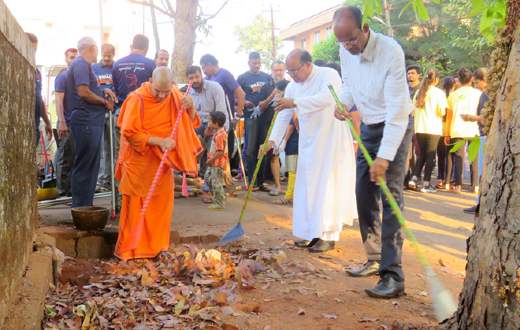
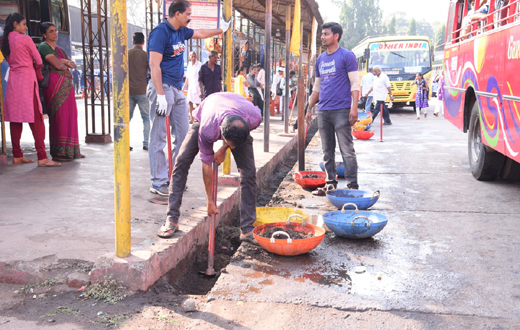
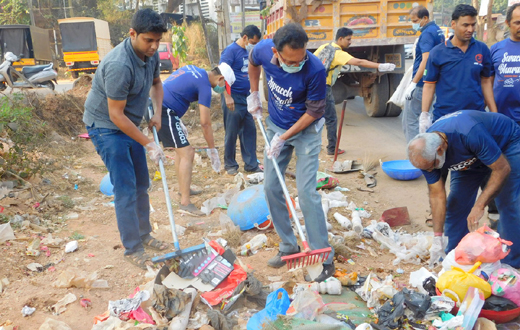
At different phases over the last five-years to its credit, scores of volunteers under RMM in complete anonymity have swept the streets, removed unauthorized banner, re-painted graffiti from the public walls, cleaned directional signage, extracted debris from bus shelters, beautified stench-ridden areas, identified over 300 garbage black-spots and monitored such areas. The volunteers made an effort to reach out to people who threw their household waste on the streets and casually even had a word with them and sensitised them of the health-haphazard caused by the improper and open disposal of Solid Waste (SW). The RMM also extended ‘sharamdhan’ across 100 villages in Dakshina Kannada and shared with them the know-how on local Solid Waste Management (SWM).
Surprisingly, the volunteers said that they find large amount of ‘Single Use Plastic’ (SUP), despite repeated claims by the Karnataka government that it has issued a notification for its ban since 2016. “Then how come SUP finds its way back through the market to the households and then found callously scattered in the road or elsewhere, either to be consumed by an unsuspecting animal or choke the flow of the drain connecting the city-line. It can neither be recycled nor it is easily biodegradable”, Vishal Kumar, a volunteer with RMM said.
Speaking to a Mangalore Today, a local trader at Central Market said that the availability of SUP is a clear case of lack of enforcement, which burst any claim made by both Karnataka State Pollution Control Board (KSPCB) and local official of curbing them. “KSPCB or MCC staff almost never makes inspection. It’s clear that they are in cahoots with the SUP manufacturers. The officials also lack political support to carry-out any search and seizure of SUP or polystyrene materials from the manufacturers. Whereas manufacturers of SUP easily bypass the rules and manufacture, store, transport SUP and polystyrene materials and systematically releasing them in the market,” a KSPSB official said.
Both urban experts and administrative officials agree that fines have a limited scope of deterring the traders or selling the ‘banned’ SUP. “Officials can’t end up chasing every individual carrying plastic on the road, it would be chaos and officers face uncertainty and risk,” a KSPB officials said.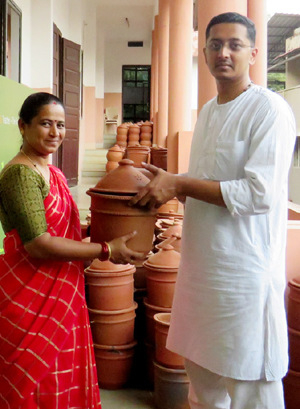 The Convener of Ramakrishna Mission Swachhata Abhiyan (SA), Swami Ekagamyananda, said over the years a lot of ignorance among people on waste disposal has been resolved. “We also held over 220 workshops to showcase to people how they can begin segregate waste at home and make compost out of the same by ‘Pot Composting’ method” he said. Infact the National Commissioner of Safai Karamchari’s (NCSK) showed keenness to check feasibility and spread awareness in the ’Pot Composting’ concept across their network of Safai Karmachari’s in the other parts of the country, since it converted all type of kitchen waste into manure in little over a month.
The Convener of Ramakrishna Mission Swachhata Abhiyan (SA), Swami Ekagamyananda, said over the years a lot of ignorance among people on waste disposal has been resolved. “We also held over 220 workshops to showcase to people how they can begin segregate waste at home and make compost out of the same by ‘Pot Composting’ method” he said. Infact the National Commissioner of Safai Karamchari’s (NCSK) showed keenness to check feasibility and spread awareness in the ’Pot Composting’ concept across their network of Safai Karmachari’s in the other parts of the country, since it converted all type of kitchen waste into manure in little over a month.
Recently Ramakrishna Mission SwacchataAbhiyan in its statement said that it had concluded its 2014 SA initiative and now has encouraged the local citizens to continue as stakeholders of the cleanliness and hygiene drive. The reasoning is quite just, given the fact that an NGO or a local government alone cannot be a torch-bearer of such socially orientated causes. No matter how best effort is put-up by public agencies to promote ‘Swachh Bharath’, if the residents continue to throw garbage indiscriminately or don’t object the vandalizing of public property or don’t complaint to the authorities against the uncivil practices – such initiatives are short-lived and bound to fail unless it turns into a public-participatory movement.
In short are Mangaloreans really committed or owning-up to keeping their local surrounding clean and hygienic on their own? Let’s take a reality check, despite popularly being a frontrunner in the media-coverage on Swacch Bharat Abhiyan (SBA) the Coastal City of Mangaluru’s in 2019 fell steep down when viewed by the parameters of the recently conducted Swachh Survekshan Survey (SSS) 2019. Although toilet sanitation is also one of the parameters under Swachh Bharath, the concern never connected with Mangaluru – given its culture of being Open-Defecation Free (ODF) since decades. Under SBA parameter, it received an ODF certification as early as 2016.
However Mangaluru City was not even endorsed by any of the special categories of SS Survey 2019, Mangalore City due to various reasons nosedived from its former 52nd position in 2018 to 165th place in 2019. This even as Mysuru, reclaimed its spot as Top 3 city, among the 4,237 urban local bodies in the country.
So what is the way forward for Mangalore to make its restore back its position in health and Hygiene?
In-fact in historical city of Mysuru; that aced its performance even at the SS Survey 2019 edition, the city is experimenting with a unique model of deploying school and college students to keep Mysuru green and clean. With the backing of Deputy Commissioner of Mysuru, Abhiram Sankar, a pro-civic group Mysore Grahakara Parishat (MGP) reported that they had experimented with five-schools - wherein they enlisted the student as Environmental Student Wardens Program (ESWP). The role of the ESW is not only to object those who throw waste openly and advise them, but also to rope in other students and institution to join the initiative. Under ESWP program, the MGP said that it plans to target about 10,000 schools in the Mysuru district. Instead of haggling with a new service provider to collect garbage, Mysuru City Corporation has formally inducted 100% of its Informal Waste Pickers (IWP) and has deployed them across it wards.
Even a small Urban Local Bodies (less than one lakh population) like Periyapatna town and Krishnarajanagara Town Municipal Council of Mysuru district have bagged 1st and 3rd position in the cleanest cities in the South Zone Category. In fact the survey conducting body identified Krishnarajanagara Town Municipal Council’s (KTMC) effort to encourage the sanitary workers. By providing health workers with Health Benefits, Protection suits and equipment, medical benefits, and identifying Best Employees at regular intervals – the ULB has boosted the morale of its health workers – who are now overzealously working for the better look of the city. By providing efficient Collection and Transportation Solid Waste Management (SWM), the Periyapatna Town Panchayat has become 100% ‘bin free’ city.
If Mangaluru were to take a lesson from the playbook of Mysuru City Corporation (MyCC), the former being one of the districts with the largest number of educational institution can easily encourage students to take part in the cleanliness drive. Beyond the regular school students, even the groups and associations such as National Cadet Corps (NCC), Scouts and Guides, National Service Scheme (NSS) and other pro-environment groups within the schools and colleges can be roped-in to lead the movement.
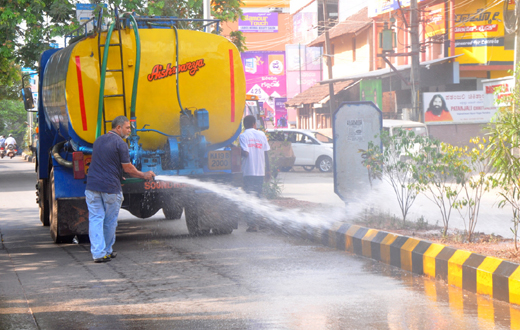
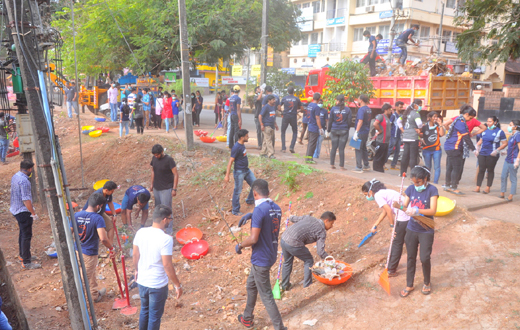
Further, even Mangaluru City Corporation (MCC) could boost the morale of its Health workers with employee benefits and scheme available to those in the contemporary in other cities and private sectors. “We are exposed to so many organic and non-organic substances including bacteria ridden packets and sharp edged items. We have repeatedly requested that we need equipment to cover from head-to-toe along with a reusable masks to protect ourselves from dust and other remnants. But so far very few of our demands are met, we hope our concerns are looked into and at least once a week we must avail health checkups so that we don’t have to put our lives at risk doing the job,” one of the Health workers said.
The Mumbai based private firm that has been roped in by the MCC to collect door-to-door waste has been unable to turn the aggregated-waste into a re-usable resource. The garbage collected by the trucks of the SWM operator are streamlined to Pachanady landfill near Mandara village. Thought the 7.63 acre Mangaluru city’s sole landfill was claimed to have been equipped city’s daily load of 200 tonnes of daily waste until 2035, it has already reached its saturation point. So it is high-time that the government not only identifies an effective or scientific measure to dispose the waste such as through incineration, but also scientifically segregate non-decomposable waste, while encouraging its recycle and reuse it.
Further it has to be noted that one of the main reason why the coverage of toilet improved from 38.7% toilet in 2014, to 100% ODF in 2019 – is the effective deployment of technological applications. Both the Ministry of Drinking Water and Sanitation Ministry of Housing and Urban Affairs not only coordinated closely of SBM, but also were able to real-time monitor the implementation of the scheme by the Swachh Bharat Mission (SBM) mobile. The app gave a major boost to the observers at the Central agencies to strategies, modify plans and programs as per the changing the outcome of the program.
For reference, Mangaluru can also take a look back in 2015 – when Bruhut Bengaluru MahanagaraPalike (BBMP) had developed a mobile Swachh Bharath App Bengaluru. The app allowed the citizens to act as mobile vigilante’s and take a picture of garbage black spots, illegal-waste-dumping or un-attended waste lying across the city. Once the user clicked and uploaded the picture, the Geographic Information System (GIS) based app – passed the picture to the concerned officers of the jurisdiction – while sending another copy to the BBMP control room. Only after the concerned field officer took action against the complaint, the matter would be ticked as resolved.
Also, recently in September BBMP – also launched a Ward Marshall system, wherein personnel from Karnataka Ex-Servicemen Welfare Society (KEWE), were recruited and deployed by the metropolitan civic agency to check on littering, garbage dumping and penalise offenders under the new SWM Bye-laws. In a matter of a month in September, close to 187 Ward Marshals had booked 1129 cases, along with 774 cases against those for violating plastic ban, in the process the BBMP had over Rs. 14 lakh in fine in that month.
Beyond improving health-standards of the people in general, if properly pursued with an economic model the motive of ‘sanitation’ can also create a sufficient number of new role and employment opportunity, logistical movements or a business opportunity and also create a new scope for Research and Development in the sanitation and waste management sector. For instance a 25-year old Dutch national, Boyan Slat who at the age of 16 encountered with more plastic than fishes gave up his aeronautical engineering and found his company Ocean Cleanup, which at its peak had over 80 employees and was worth $30 million. There are several more individuals and co-operatives, wherein waste segre-gation and management has turned into a golden opportunity for them, on the other hand – for many more it has turned into an investment and employment opportunity.
Moreover it has to be noted; that Dakshina Kannada houses several potential tourism circuit, including Coastal, Spiritual, Medical, Educational, Heritage, Rural; among others. Creating a clean and hygienic environment, will surely attract more tourism footfall in the region, that can create not only a boost to its revenue earning but also create a wide array of employment and business opportunities for the region in the mainstream hospital, logistical, service and allied sectors.
Not many may be aware but Swachh Bharath Mission is not just an isolated attempt by India to keep its region clear but also its and effort to align with one of the 17 Sustainable Development Goals (SDG6) set-up by the United Nations General Assembly (UNGA) in 2015. SDG6 in particular deals with refers to clean water and sanitation for all the people. SDG6 is among the eight target of the member nations to be achieved by at least 2030. And to attain that end, it’s quite essential that as a city Mangaluru puts its best foot forward in carrying forward the mantle of SBA mission that was passed on by the Ramakrishna Mission.
- Need For ‘Students, Alcohol and Drugs’ survey
- New Synthetic Drugs Trapping Youth
- Mood Modifying Chips - Future of Drug Use
- Ramping up Indo-Bangla border security
- IITM- A premier educational Institution in a forest. What can we learn?
- Former PM, Manmohan Singh: Notable laws passed under his tenure
- Hashish on Ratnagiri Seashore
- The Poor cry out to Us: Do we respond?
- Clandestine Meth Labs Sprouting Across India
- Hydro ganja from Bangkok latest craze among youth in India
- "Memories to Treasure" Dr.Michael Lobo’s new book
- Dominance of Private Universities: Will it make education inaccessible to underprivileged students?
- Monti Phest: A rich heritage of South Canara
- Kashmir Bhavan in Bengaluru: A must visit place
- "MAI and I" Book of Angelic Emotions
- Draupadi Murmu - The New ’President of India’
- Anthony Ashram in the city grows a classic museum
- First College of Fisheries in India - A Golden Jubilarian
- Flushing Meadows - A Vintage Mansion
- The Colonel�s Bequest
- A Mangalorean PM and his RBI Governor Brother: The Extraordinary story of the Benegal Brothers
- There is no higher religion than Truth: Theosophical Society
- L�affaire - Ashu & Yiju of Mangalore
- Mangalore in Kowloon
- 1568 to 2018 AD: 450 years of Christianity in Mangaluru
- Vice President elect Naidu moves on from nadir to zenith, the phenomenal journey
- Embracing the Outdoors: How Heated Jackets Are Revolutionizing Cold Weather Activities
- Efficient and Sustainable Packaging Solutions with FIBCs
- The Hybrid Kilt Revolution | Where Tradition Gets Trendy
- Affordable Elegance | Embrace Style on a Budget with Cheap Kilts
- Unleashing Style and Functionality | Exploring Tactical Kilts
- Mangalore’s Heroic Lady marks 105th Birthday
- Santa the Christmas spirit
- Geriatric care: Mangalore strikes a fine balance
- The Don Who Made Two Empires to Clash
- CHITRAPUR SARASWATS - A Great Kanara Community
- Our new President Ram Nath Kovind’s significant journey to Rashtrapathi Bhavan
- Marriages made in heaven, big fat weddings made in India
- Eid insight - The giver of glad tidings
- CITY INFORMATION
- TRAVEL
- TOURIST INFORMATION
- HEALTH CARE
- MISCELLANEOUS




 Write Comment
Write Comment E-Mail To a Friend
E-Mail To a Friend Facebook
Facebook Twitter
Twitter  Print
Print 


